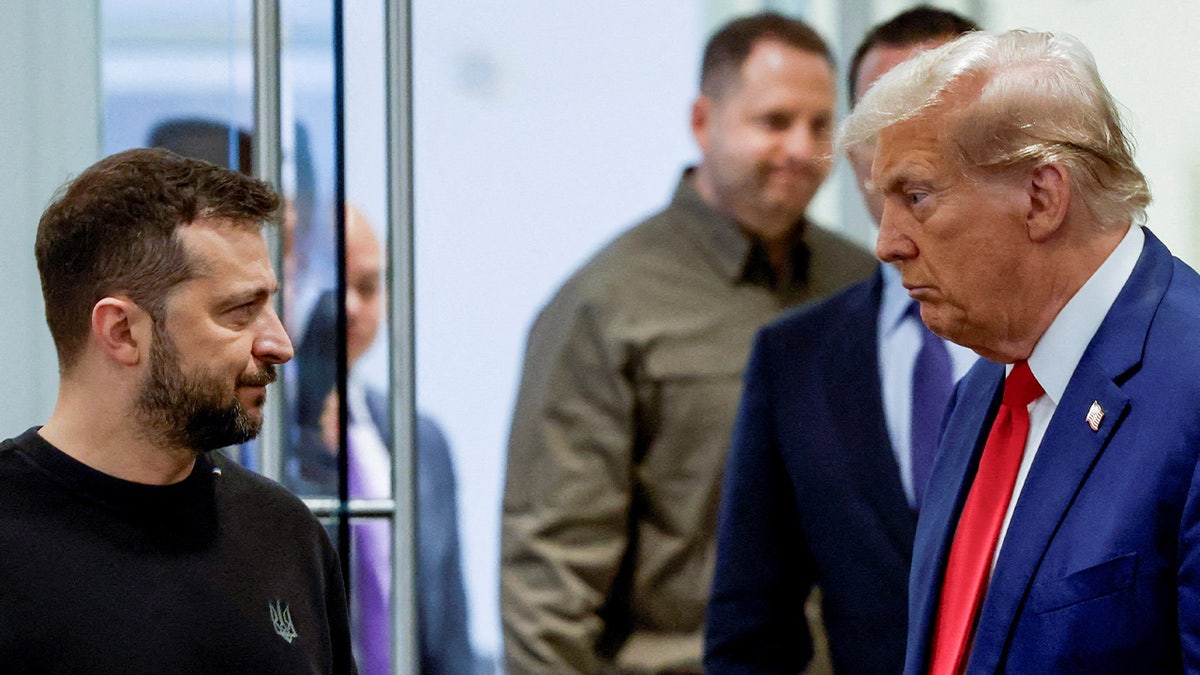Ukraine And Russia: Trump's Actions And Their Geopolitical Consequences

Table of Contents
Trump's Ambivalence Towards NATO and its Impact on Ukraine's Security
Trump's presidency was marked by a pronounced ambivalence towards NATO, significantly impacting Ukraine's security. This attitude manifested in several key areas, creating vulnerabilities for Ukraine and undermining transatlantic unity.
Questioning NATO's Value
Trump repeatedly questioned NATO's relevance and criticized member states for insufficient defense spending. His rhetoric sowed doubt about the alliance's commitment to collective defense, weakening its credibility.
- Examples: Trump's public statements labeling NATO as "obsolete" and demanding increased financial contributions from European allies directly undermined the alliance's cohesion.
- Impact on Alliance Cohesion: This uncertainty fueled internal divisions within NATO, making it harder to present a united front against Russian aggression. This created a perception of weakness, emboldening Russia.
- Ukraine's Vulnerability: For Ukraine, already facing Russian aggression, this weakening of NATO's resolve presented a significant threat, diminishing its hope for collective security guarantees.
Hesitation in Providing Military Aid to Ukraine
Trump's administration was often hesitant to provide lethal military aid to Ukraine, hindering its ability to defend itself against Russian-backed separatists. This reluctance stemmed from a combination of factors, including a perceived desire to appease Russia and internal political considerations.
- Specific Instances: Delays in providing Javelin anti-tank missiles and other crucial defensive weaponry weakened Ukraine's military capacity. Reports of withheld aid further fueled concerns about US commitment.
- Impact on Ukraine's Defensive Capabilities: The delayed or insufficient provision of aid hampered Ukraine's ability to effectively counter Russian-backed forces in the Donbas region.
- Political Motivations: Some analysts suggest Trump's hesitation stemmed from a desire to cultivate a better relationship with Russia, potentially at the expense of Ukraine's security.
The Weakening of Transatlantic Unity
Trump's actions significantly weakened the transatlantic alliance, creating opportunities for Russia to exploit divisions within the Western bloc. This erosion of trust and cooperation undermined collective security efforts aimed at deterring Russian aggression.
- Strained Relationships: Trump's confrontational approach towards European allies, coupled with his criticisms of the EU, strained transatlantic relationships, leaving a vacuum for Russia to fill.
- Emboldened Russia: Russia took advantage of this weakening of transatlantic unity, expanding its influence in Eastern Europe and the Middle East.
- Impact on Collective Security: The diminished cooperation among Western allies weakened their collective security posture, making them less effective in countering Russian aggression.
The Trump-Putin Relationship and its Influence on the Ukraine Conflict
The nature of the Trump-Putin relationship played a significant role in shaping the US response to the Ukraine conflict. Trump's generally positive rhetoric towards Putin and his infrequent condemnation of Russian actions sent a clear message to Moscow.
Positive Rhetoric and Lack of Condemnation
Trump's rhetoric towards Putin was often unusually positive, contrasting sharply with the responses of previous US administrations. This lack of strong condemnation of Russia's actions in Ukraine emboldened Moscow.
- Examples: Trump’s public statements praising Putin's leadership and downplaying Russia's role in the annexation of Crimea sent a troubling message to the international community.
- Comparisons with Previous Administrations: This contrasted significantly with the strong condemnations and sanctions imposed by previous administrations following Russian aggression.
- Message to Russia: The lack of consistent condemnation from the Trump administration arguably signaled a lack of resolve in confronting Russian aggression.
Meetings and Summits
The high-profile meetings between Trump and Putin, particularly the Helsinki Summit, were heavily scrutinized for their lack of concrete actions against Russia’s aggression in Ukraine.
- Helsinki Summit and its Outcomes: The Helsinki Summit was particularly controversial due to Trump's apparent siding with Putin over US intelligence agencies regarding Russian interference in the 2016 election. This lack of accountability for Russian actions fueled concerns globally.
- Public Statements: The public statements made following these meetings often lacked strong condemnation of Russia's actions, further fueling concerns about a lack of US resolve.
- Accountability for Russian Actions: The perceived lack of accountability for Russia's actions in Ukraine raised serious questions about the Trump administration's commitment to upholding international norms and defending its allies.
The Helsinki Summit Controversy
The Helsinki Summit in 2018 remains a highly controversial event, significantly impacting perceptions of the Trump administration's approach to Russia and the Ukraine conflict.
- Key Events and Statements: Trump's statement that he believed Putin's denial of Russian interference in the 2016 US election over the assessment of US intelligence agencies caused a major uproar.
- Domestic and International Reactions: The summit drew widespread condemnation domestically and internationally, raising questions about the Trump administration's commitment to defending democratic values and countering Russian aggression.
- Long-Term Consequences: The Helsinki Summit significantly damaged US credibility on the world stage and emboldened Russia to further its aggressive actions.
Long-Term Geopolitical Consequences of Trump's Actions
Trump's actions towards Russia and Ukraine had far-reaching geopolitical consequences, impacting regional stability, international norms, and the future of the region.
Increased Russian Aggression
Trump's policies arguably emboldened Russia, leading to increased aggression in Ukraine and the surrounding region. This escalation of conflict threatened regional stability and the broader international order.
- Increased Military Activity: The period witnessed a marked increase in Russian military activity near the Ukrainian border and in the occupied territories of eastern Ukraine.
- Escalation of Conflict: The conflict in eastern Ukraine intensified, with increased fighting and casualties. The Minsk agreements, aimed at resolving the conflict, were largely ignored.
- Annexation of Crimea: While the annexation of Crimea preceded Trump's presidency, his administration's reluctance to strongly condemn this act arguably emboldened Russia.
Weakened International Norms
Trump's approach to foreign policy potentially undermined international norms and institutions designed to prevent aggression and promote peaceful conflict resolution.
- Undermining International Law: Critics argued that Trump's actions, such as questioning the value of international alliances and institutions, undermined international law and norms.
- Impact on Credibility of International Institutions: The perceived weakening of US commitment to international institutions reduced their effectiveness in addressing global challenges and deterring aggression.
- Long-Term Implications for Global Security: The erosion of international norms and institutions creates a more unpredictable and dangerous international environment.
Impact on the Future of Ukraine and Eastern Europe
Trump's actions had lasting effects on the future stability and security of Ukraine and Eastern Europe, creating a more volatile and uncertain environment.
- Projections for the Future of the Conflict: The unresolved conflict in eastern Ukraine continues to pose a significant threat to regional stability. The potential for further escalation remains a serious concern.
- Potential Scenarios for the Region: Various scenarios, including further Russian aggression and increased tensions with NATO allies, are possible.
- Role of the US and its Allies: The US and its allies will play a crucial role in shaping the future of the region, providing support to Ukraine and deterring further Russian aggression.
Conclusion
This analysis of "Ukraine and Russia: Trump's Actions and Their Geopolitical Consequences" reveals a complex interplay of policy decisions with significant geopolitical consequences. His ambivalence towards NATO, his reluctance to confront Putin directly, and his often-positive rhetoric toward the Russian leader emboldened Russian aggression and undermined international norms designed to deter such behavior. The long-term effects of these actions continue to shape the conflict in Ukraine and have broader implications for the stability of Eastern Europe and the international order. Understanding these consequences is essential for comprehending the current crisis and anticipating future challenges. Further research and critical analysis of these actions are crucial to preventing similar situations from unfolding in the future and ensuring a more secure and stable international environment.

Featured Posts
-
 Uks Rarest Wildlife Wildfires Push Species To The Brink Of Extinction
May 13, 2025
Uks Rarest Wildlife Wildfires Push Species To The Brink Of Extinction
May 13, 2025 -
 Rome Open Sabalenka And Gauff Victorious Avoid Early Exit
May 13, 2025
Rome Open Sabalenka And Gauff Victorious Avoid Early Exit
May 13, 2025 -
 Chicago Bulls And The Nba Draft Lottery Cooper Flaggs Chances
May 13, 2025
Chicago Bulls And The Nba Draft Lottery Cooper Flaggs Chances
May 13, 2025 -
 Persipura Jayapura Dominasi Rans Fc 8 0 Di Playoff Liga 2 Kokoh Di Puncak Grup K
May 13, 2025
Persipura Jayapura Dominasi Rans Fc 8 0 Di Playoff Liga 2 Kokoh Di Puncak Grup K
May 13, 2025 -
 Byd V Evrope Slaby Start Zachrana V Hybridech A Lokalnim Managementu
May 13, 2025
Byd V Evrope Slaby Start Zachrana V Hybridech A Lokalnim Managementu
May 13, 2025
